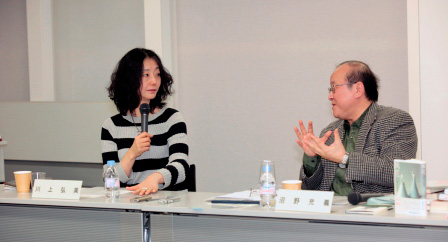The Wavering World and Wavering Boundaries of Reality and Fantasy: Discussing the novel Kazahana with translators of Japanese literature
Hiromi Kawakami, Author
Mitsuyoshi Numano, Professor at the University of Tokyo
The 2nd Japanese Book News Salon
The "Japanese Book News Salon--a talk session with contemporary Japanese writers" is an excellent opportunity for translators or future translators to actually meet authors featured in the English newsletter Japanese Book News (JBN) and talk about their work. (The Japanese Book News (JBN) is issued by the Japan Foundation, providing information on the publishing industry and publications in Japan for publishers, editors, and translators overseas). The second such event was held at the Japan Foundation Information Center (JFIC) Hall "Sakura" on the second floor of the Japan Foundation headquarters, welcoming the author Hiromi Kawakami and Professor Mitsuyoshi Numano of the University of Tokyo to discuss with translators of various nationalities Kawakami's novel Kazahana (published by SHUEISHA in April 2008 and featured in JBN No. 58, December 1, 2008).
On the revised version of Kawakami's debut piece Kami-sama (God Bless You) after the 2011 nuclear plant accident
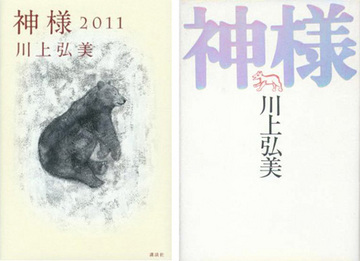
Left: Kami-sama 2011 by Hiromi Kawakami (Publisher: Kodansha)
Right: Kami-sama by Hiromi Kawakami (Publisher: Chuokoron-Shinsha)
NUMANO: First, let's talk about your recent work, Kami-sama 2011 (God Bless You, 2011). It's a new version of your 1994 debut work Kami-sama, and you made a few revisions to reflect the situation in Japan after the Fukushima Daiichi nuclear plant accident. Though the changes seem minor, amazingly it somehow manages to capture the world in a completely different light. I think it can be described as a crystallization of your career as a writer from your debut till Kami-sama 2011 of last year. I thought it was a symbolic piece in that sense, too.
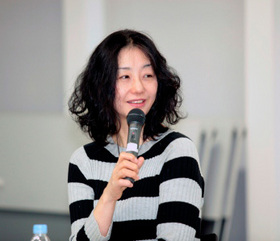 KAWAKAMI: I started my career as a writer with Kami-sama. It was an extremely short piece only about 10 pages long written in 400-character manuscript paper. For those of you who aren't familiar with it, I'll just give a brief summary. It's about a courteous bear who moves into the neighborhood one day, and he invites the main character to go down to the river. They go and eat lunch by the river and come back. That's practically about it. The bear also symbolizes a minority, so it does have that certain sadness to it, but still it's a very peaceful story of everyday life.
KAWAKAMI: I started my career as a writer with Kami-sama. It was an extremely short piece only about 10 pages long written in 400-character manuscript paper. For those of you who aren't familiar with it, I'll just give a brief summary. It's about a courteous bear who moves into the neighborhood one day, and he invites the main character to go down to the river. They go and eat lunch by the river and come back. That's practically about it. The bear also symbolizes a minority, so it does have that certain sadness to it, but still it's a very peaceful story of everyday life.
And so it was that I became a novelist, but last year, there was the earthquake of March 11 and I found I couldn't get myself to write anymore. I'm a writer who likes writing about everyday life. But then, that disaster shattered the tangible world that we had known until that point. And not only did the earthquake demolish our world, but the nuclear plant accident transformed our everyday lives into something radically different from what it had been before.
Then, the impact on everyday life also differs depending on where you live in Japan. We are leading normal lives in Tokyo, but the people of Fukushima or the Tohoku region are still waiting for recovery efforts to make progress.
When I thought about how I should address this, I found myself going back to the story of my first novel, of going for a normal walk. I thought about how I would write the novel if I were writing it now.
It was still around March 15, when the Fukushima reactors 1, 3, and 4 were exploding and having cooling problems, and were in fact experiencing meltdowns.
So, the ordinary act of going out for a walk and just going outside felt restricted. And then again, it wasn't as if we were "prohibited" to go out, but we were "advised to be careful" when going out, so it was up to us; we had to choose what to do.
I didn't change much of the text of the original Kami-sama. For example, the bear catches fish in the river, dries it, and gives it to the protagonist, "I," saying "Here's some dried fish." But now, that fish is contaminated with cesium, and the bear has to say, "Don't eat it though," as he offers the fish.
NUMANO: It's true you haven't changed the text itself that much. A few words added here or changed there. But I thought it was pretty much like the real world we live in. In other words, since the nuclear plant accident, we've been living in Tokyo as we've always done and nothing much has changed. I would say that maybe 90% of the text of the 2011 version remains the same as your debut piece written 18 years ago.
KAWAKAMI: Yes, perhaps more than 95%.
NUMANO: That's why the new version seems as if it's only a minor revision. But in fact, it describes a completely different world. That's what's so interesting about it.
I understand that Kami-sama hasn't been translated into many other languages. The English translation (God Bless You, 2011) was published in Granta recently?
KAWAKAMI: Yes.
NUMANO: There's a Russian translation of Kami-sama. It's a piece I really like so I included it in an anthology I supervised ("Kare" and "Kanojo" (He and She) published by the Japan Foundation and Inostranka).
For Europeans, "god" is usually the one "God" of Christianity, with a capital "G," so your work may come as a surprise for readers. A "bear god" may seem rather Japanese, and might even be impossible to imagine. But when you read the book, you can sense a world where there are many gods, coexisting with humans in nature, and offering us blessings.
KAWAKAMI: In Japan, we even have a god for ovens, and we call the sun ohi-sama (one of the words for "sun," with the honorific sama added to show respect to the sun as a god). There are gods in things around us, the weather, and everything. And as in the word kotodama (or literally "word spirit") we believe that gods also live in the words that come out of our mouths and that if you say something bad, something bad will happen. It's an ancient form of animism. As children our grandmothers told us that if we did something bad we wouldn't be able to get away with it because the sun god would be watching from above. It's not as if we actually believe it literally, but that way of thinking has remained within us somehow.
NUMANO: It seems as though we had been in a sort of fairytale-like carefree world coexisting with nature, and then nuclear energy, a terrifying god of a clearly different quality, crashed in on us. Shinichi Nakazawa also said in a different context that nuclear power was a concept born from the principle of monotheism, and I thought that was interesting.
Depicting the ambiguous and wavering "I" in the world
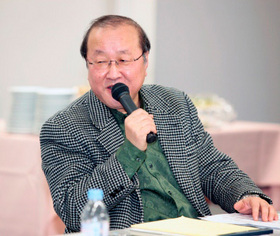 NUMANO: By the way, you were actually a science student at university, weren't you? I suspect many of the fans of the popular author Hiromi Kawakami would have a hard time picturing you as a science major. But I sense that that scientific education lies at the root of your career as a writer.
NUMANO: By the way, you were actually a science student at university, weren't you? I suspect many of the fans of the popular author Hiromi Kawakami would have a hard time picturing you as a science major. But I sense that that scientific education lies at the root of your career as a writer.
KAWAKAMI: I studied biology at university. I'd wanted to study humanities, but then I heard that you had to write a 100-page thesis and I thought I'd never be able to finish something that long!
When I write a novel, I ask myself what human beings are about. What happens when a lot of people are around, including myself? What are the relationships between them? That's what I always think about when I write. You could think of it as a literary approach, but then again, biology is a science that studies humans as creatures in nature, how they relate to other animals and plants, what sort of systems they are made up of, and how those systems work. So I think there's something similar in the way I see things when I'm writing.
NUMANO: Before you became famous, you wrote science-fiction, and were also involved in the avant-garde magazine NW-SF. Maybe that kind of beginning had something to do with your later career.
In your style of writing, like with Kazahana for example, where you've written a romance novel featuring ordinary people, there are few elements of fantasy. But with much of your work, especially in your early years, the boundaries of reality and fantasy are intertwined in a complex manner or blend into each other. I have a feeling that it's not simply about science but points to your early interest in speculative science-fiction.
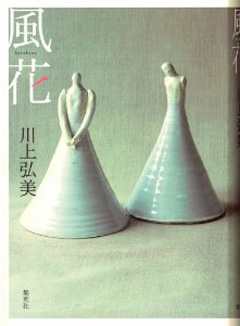
Kazahana by Hiromi Kawakami (Publisher: SHUEISHA)
KAWAKAMI: I think it's about how I see the world. There are lots of people, and we have this time, here and now in Japan. It seems like a stable reality, but maybe if you adjusted your perspective just a little, it could become a completely different world. That's the kind of thing I always think about. That's why maybe the way I see the protagonist "I" differs from the traditional literary view. With Japanese literature, I think the main theme has been how you perceive "I." But I don't believe there's that much to "I," it's just a small speck in nature, and whether it's self-aware or not, the world keeps on turning. But I'm not saying it's unimportant because it's only a speck; I do believe a speck has its own point of view, too.
NUMANO: I agree. With the traditional junbungaku (or "pure") Japanese literature, the "I" is the last stronghold. Even if you can't write anything, even if you can't think of an interesting plot, as long as the writer delves into the "I" it counts as a literary work. I think you've never bothered with this from the beginning.
KAWAKAMI: No, I haven't. The "I" is really something ambiguous or something that isn't quite established and is wavering. So the world also wavers through the eyes of "I" and the boundaries between reality and fantasy also waver. I think I've always felt that when I write.
NUMANO: Since you mention it, the characters in Kazahana also waver and the relationships between them are not quite clear. You're not sure if they're in love or not. But I think that's something we see in many of your pieces.
You became better known with Sensei no kaban (The Briefcase). That novel is actually complex as well. If you read it simply from the point of view that it's an elderly teacher and a young woman feeling attracted to each other, you'd miss a lot. The teacher is quite old, so there's the sense of death in the air. The border between life and death is very ambiguous and it feels as though you're stepping into that delicate area.
Another novel I like is Manazuru. I think with that piece in particular, the reader isn't quite sure what is reality and what is fantasy. It's a piece that sort of breathes, or is filled with so many subtle things, but you can't quite put your finger on who the protagonist is or if the ghost is real or not. It's full of this atmosphere, and in that sense, I think it's the piece that best showcases your characteristics as a writer.
KAWAKAMI: Thank you.
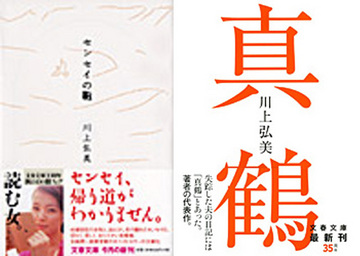
Left: Sensei no Kaban by Hiromi Kawakami (Publisher: Bungeishunju)
Right: Manazuru by Hiromi Kawakami from (Publisher: Bungeishunju)
How to translate the title Kazahana into other languages
NUMANO: Now, we're going to try something interesting today. I've asked some young translators to prepare an excerpt of Kazahana in English, Korean, and Russian. I'd like to get some comments from the translators, but let's start by talking about a key issue, the most difficult word to translate, which is also the title of the piece, namely Kazahana.
KAWAKAMI: Kazahana [written as "wind flower" in kanji characters] refers to the kind of snowfall, so fine that you can't even call it snow, where a few flakes seem to have drifted in from somewhere on the wind. It's a phenomenon you often see as the first snowfall of winter.
English translator: In English, there is the word "windflowers," but it points to a rare poisonous flower (Anemone nemorosa, Japanese name yabuichige), so it wouldn't be appropriate in this case. Having said that, I don't think many people actually know this flower, so I made up the word "snow windflowers" as a translation for kazahana. If I'd translated it as "snow does not fall," in other words snow that doesn't fall to the ground, I don't think it would convey the nuance of kazahana.
NUMANO: It had been featured in an article in JBN No. 58, the Japan Foundation's quarterly magazine, and it was translated as "Whirling Snowflakes," avoiding the word "flower" completely.
Russian translator: I'm always envious of how poetic the Japanese language can be. Maybe my translation isn't appropriate, but I connected the images of flowers and snow and called it "Pollen and Snow."
NUMANO: "Pollen" has a poetic feel in Russian. But maybe pollen is actually a bit too fine.
Korean translator: If I'd just kept the kanji of kazahana, in Korean, it would read as punghwa, which means "deterioration." If I translated it into "flowers of the wind," it would become the name of a specific flower. So I added a little explanation in the dialog of the main text saying "this kind of snow is called ..." so the reader could imagine the snow.
NUMANO: Now, within the piece, for example, there's Mako-chan, who's the uncle of the lead female character. In Japanese, there is a subtle difference in nuance between calling someone by their name with -chan on the end, and calling them by their name alone. [The Japanese -chan shows the speaker's affection for that person.] Is this impossible to translate?
English translator: I guess it would be okay if you had some footnotes, but if it comes up repeatedly, I think it would seem unnatural.
NUMANO: There's a bit where the lead character is asked, "Yuri-chan, do you want to get divorced?" and the English translation is "Do you want it? A divorce?" and "Yuri-chan" has been omitted. Usually, you call someone by name in English, and less so in Japanese conversation. So I thought it was interesting that it was the opposite in this case.
Russian translator: I also thought a lot about whether to use -chan or not, but I decided to keep it. I don't think many Russian readers understand the nuance of a name having -chan on the end, but when I translate, I tend to conform to the original Japanese, so I ended up keeping it in the Russian translation, too.
NUMANO: But now there are quite a few Russian translations with -chan.
Polish translator: In Polish translations, you see -san [expressing respect] quite often, but not so many -chans. So I don't think the reader would understand. Russian and Polish languages also have a diminutive form, and you could choose to use that, but I don't think you could express the nuance of "Mako-chan" through that diminutive form.
NUMANO: The diminutive form in European languages is making a change to the end of a word to express affection for something cute or small. In the dialect of Akita prefecture in northern Japan, you could call a beko ("cow") a bekokko. It's that kind of thing. The Russian and Slavic languages are designed grammatically to be capable of creating diminutive forms, so you can easily use the diminutive form with names. Like Ekaterina becomes Katya or Katyusha and then Katyenka.
English translator B: In English, there are many words you can use to call someone, like "darling," "dear," or "honey." They're all words that are exceedingly difficult to translate into Japanese. But then again, if you're translating from Japanese into English, I think one way is to use these types of words instead of the name. Of course, "darling" wouldn't be appropriate to describe the relationship between the lead character Noyuri and her uncle Mako in Kazahana!
NUMANO: That's the problem and a characteristic of Kawakami-san's work. It's a Japanese kind of relationship in a way. Mako and Noyuri are attracted to each other, but are they lovers? Not quite.
KAWAKAMI: They are uncle and niece, so they can't be lovers, but they have an ambiguous relationship.
Korean translator: In Korea, you would never call your uncle by name. It would be unimaginable as a relationship. So in order to express the wavering relationship in the novel, I felt I had to call him by name, and kept it as it is in my translation.
KAWAKAMI: It's not something you often see in Japan either because an uncle is your elder. These two have an unusual relationship, so I made her call him "Mako-chan." These people are a bit abnormal!
NUMANO: When it's in your work, the characters become people who you can sort of relate to, so you don't feel that it's so abnormal. I think that's the power of your writing.
Heading into an age where it's not simply a Japanese novel but a novel
Chinese translator: Chinese publishers always tell me that I wouldn't be appropriate to translate the work of female authors because I'm a man. So what I'd like to ask is do you as an author have a preference whether the translator is male or female?
KAWAKAMI: I'm a woman but I think I have a lot of masculine qualities. Some male authors can have many feminine traits. I think everyone has both sides, so I don't mind, either is fine. Michael Emmerich translated my Manazuru into English. As long as it's someone who likes my books, I don't mind if it's a man or a woman who translates them!
NUMANO: The relationship between a translator and author is different in each case. Some translators ask the author many questions, and some authors would be happy to address each question in detail, and others simply leave it up to the translator to think about what it means.
KAWAKAMI: I tend to forget what I've written, so I'm the type that leaves it up to the translator.
NUMANO: If a corresponding between the translator and author becomes frequently, sometimes it doesn't work out if they don't get along as people. So rather than whether the translator is a man or a woman, I think it is better if the translator and the author are similar as people.
KAWAKAMI: That's right. The same can be said for the relationship between a writer and an editor. I think the people who want to translate my work or want to work with me are people who are close to my heart.
I understand it's much more difficult to try and translate the Japanese work into other languages, compared to translating between languages that are similar such as English and French. I appreciate the efforts of anyone who would be willing to take the time to translate my work, and would welcome an offer any time.
NUMANO: Then, for example, how has Kawakami-san's work been received in France? Do they see her as an exotic author from the East, or as simply one of the contemporary writers?
French translator: That's a difficult question. There have been comments and book reviews, but I'm not sure if she has a readership. What I can say is that Manazuru was published as a paperback in France quite recently. Sensei no Kaban became a paperback a while ago. We can always dream of getting a bestseller selling a million or two million copies, but we're happy with sales figures of a couple thousand or ten thousand.
NUMANO: Those are big figures for Europe.
French translator: After the translation of this piece came out, it led to the next piece, so I believe they're being read. You hear some readers asking each other, "Have you read recent books by Kawakami?"
NUMANO: People have begun to read Japanese literature all over the world now, and I think translation of contemporary Japanese literature is particularly advanced in France. Besides Kawakami-san, there are many translations out there like, of course, Haruki Murakami or Yoko Ogawa. So, it's not the genre of "exotic literature from Japan" or "oriental literature" anymore?
French translator: No, it's no longer like that. They are a part of contemporary literature, or part of literature.
KAWAKAMI: In my work, Sensei no Kaban has been translated the most often, followed by Manazuru. I just had an offer from Thailand for the first time to translate my work. It's a piece called Zarazara, a collection of short pieces I published once every two months for a magazine for young women. Many are readable pieces like love stories, and the Thai people came to me saying they wanted to translate that book first. My agent and I were surprised and told them it was an unusual choice, and then they said it was the type of thing their readers were looking for. So I realized they weren't looking for something "from Japan," but something that would satisfy their readers who wanted to read love stories.
It was a revelation for me that they wanted to translate my work not necessarily because it was Japanese or exotic. Of course, I'm sure it must be a factor that we are from the same Asia region, too.
NUMANO: Translations may sell if a big publisher spends the money to advertise, but the most crucial element is for there to be a good translator who really loves the original work and puts a lot of effort into getting the translation done.
I think we had a wonderful discussion here, and I'd like to thank the translators and Japanese experts for kindly participating today. Thank you very much for your time.
Recorded at the Japan Foundation JFIC Hall "Sakura" on January 24, 2012.
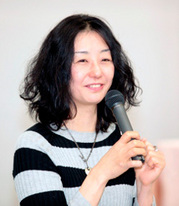 Hiromi Kawakami
Hiromi Kawakami
Author born in 1958. Won the Akutagawa Prize for Hebi o fumu (Tread on a Snake) in 1996, the Tanizaki Prize for Sensei no kaban (The Briefcase) in 2001, and the Minister of Education, Culture, Sports, Science and Technology's Art Encouragement Prize for Manazuru in 2007. Has been on the Akutagawa Prize judge panel since summer 2007.
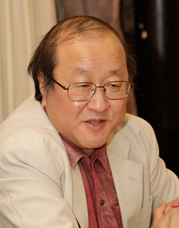 Mitsuyoshi Numano
Mitsuyoshi Numano
Professor of Literature, Department of Contemporary Literary Studies, the University of Tokyo. Specializes in and translates Polish and Russian literature. Deeply interested in contemporary Japanese literature and writes literary reviews. Sits on the editorial committee for Japanese Book News. Currently serves as a member of the JBN Advisory Board.
About Kazahana
The protagonist Noyuri is a 33-year-old woman in her seventh year of marriage. One day, she receives an anonymous phone call informing her of her husband Takuya's infidelity. She and her indecisive husband both think of getting a divorce but it is not easy reaching a conclusion. A full-length romantic novel of fading love in the setting of ordinary everyday life.
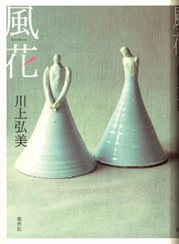 Kazahana by Hiromi Kawakami (Publisher: SHUEISHA)
Kazahana by Hiromi Kawakami (Publisher: SHUEISHA)
Hardcover: 288 pages
Publisher: SHUEISHA (April 4, 2008)
ISBN-978-4-08-771207-0
Price: \1,470 (incl. tax)
Paperback: 312 pages
ISBN 978-4-08-746684-3
Price: \600 (incl. tax)
* The Japan Foundation headquarters' JFIC library keeps the following translations of works by Hiromi Kawakami for public use. http://lib-opac.jpf.go.jp/mylimedio/search/search.do?mode=comp&keyword=kawakamiHiromi
* Information on translated Japanese literature is available on the Japan Foundation website. Forty titles of Hiromi Kawakami's works translated into Russian, German, French, English, Italian, Polish, Dutch, Spanish, Catalan, and Portuguese are listed on our website. Use this database to search and see how Japanese literature is translated into other languages.
Click here to search Japanese literature translation bibliography.
Related Events
Keywords
- Literature
- Translation
- Language
- Education/Children
- Interpretation
- Japan
- JFIC
- Japanese Book News
- Nuclear plant accident
- Novels
- Kami-sama
- Kami-sama 2011
- March 11
- Great East Japan Earthquake
- Meltdown
- Fukushim nuclear plant
- Tokyo
- Granta
- Anthology
- NW-SF
- Kazahana
- The Briefcase
- Manazuru
- Haruki Murakami
- Yoko Ogawa
- Zarazara
Back Issues
- 2025.6. 9 Creating a World Tog…
- 2024.10.25 My Life in Japan, Li…
- 2024.5.24 The 50th Japan Found…
- 2024.5.24 The 50th Japan Found…
- 2024.5. 2 People-to-People Exc…
- 2024.5. 2 People-to-People Exc…
- 2023.12. 7 Movie Theaters aroun…
- 2023.6.16 The 49th Japan Found…
- 2023.4.24 The 49th Japan Found…
- 2022.12.27 Living Together with…


